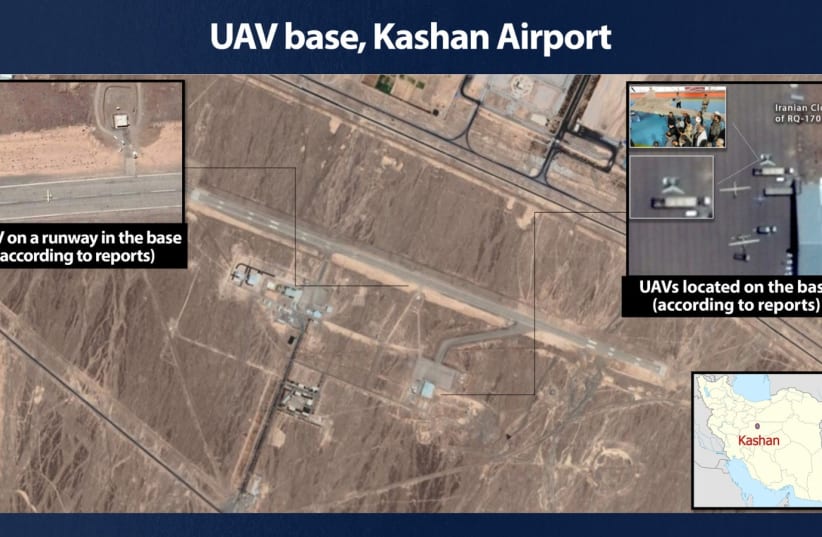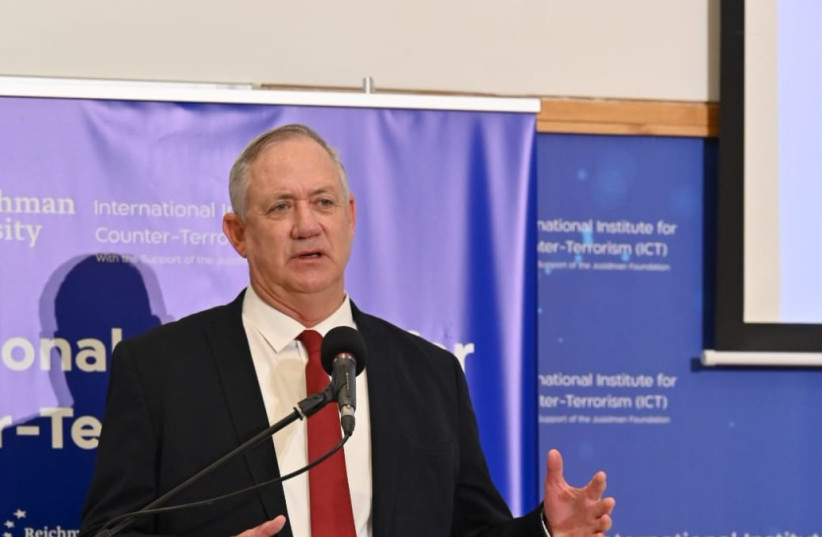Iran is training militias from various countries to operate advanced unmanned aerial vehicles at Kashan Base, Defense Minister Benny Gantz said Sunday.
Gantz, who was speaking at the Institute for Counter-Terrorism Policy at Reichman University in Herzilya, said that the Islamic Republic is training militias from Iraq, Yemen, Lebanon, and Syria at the airbase north of the city of Isfahan and is trying to teach them how to manufacture Iranian drones.
"Iran has created ‘emissary terrorism’ under the auspices of organized terror armies that help it achieve its economic, political, and military goals. Iran is trying to transfer its knowledge that will enable Iraq, Syria, and Lebanon. Also in the Gaza Strip, to produce advanced UAVs,” he said.
According to Gantz, terror operatives from those countries are being trained on flying Iranian UAVs at the base “which is the cornerstone of Iranian aerial terrorism in the region.”
According to Gantz, the Houthis in Yemen and Shiite militias in Iraq have dozens of advanced UAVs that they have used against Saudi Arabia or American forces in the region. In the coming years, hundreds of these UAVs will be in Syria and there are constant attempts to smuggle advanced UAVs to Hezbollah in Lebanon. Iran is also attempting to transfer the know-how needed for UAV production to terror groups like Hamas and Palestinian Islamic Jihad in the Gaza Strip.
Iranian drones can reach a range of 1,700 kilometers and their attacks have targeted assets belonging to the United States, Saudi Arabia, Israel as well as Sunni organizations in Syria and Iraq.
The attacks, including deadly ones like on the Mercer Street, have led to an urgent need for a response to Iranian drones. According to a report in Haaretz, those issues have been a central aspect of the recent security meeting between Israel and the United States during visits by both Gantz and IDF Chief of Staff Lt.-Gen. Aviv Kohavi.
“Iran is investing hundreds of millions of Rials in the production and export of UAVs and weapons. It’s doubled its defense budget at the expense of its citizens. The production of advanced UAVs like the Shahad 136 costs tens of thousands of dollars, imagine how many thousands of vaccines could have been provided to citizens at the cost of a single UAV,” Gantz said.
Turning to Iran’s nuclear program, he said that Tehran “does not honor the agreements that it’s signed and there is no reason to believe that it will honor any future agreements.”
According to Gantz, a nuclear Iran would lead to a regional arms race that would be an existential threat to Israel and the entire world.
The defense minister said that the recent report by the International Atomic Energy Agency that found that Iran has continued to increase production of high-enriched uranium while failing to resume full cooperation with nuclear inspectors was the “first time in a decade” that it cast doubt on the civilian nature of Iran’s nuclear program.
“Iran does not honor the agreements it has signed, and there is no reason to believe that it will honor any future agreements. The time has come for action. I call on the countries that are still members of the nuclear agreement to impose the sanctions set out in the agreement. It's time to make a ‘snapback,’” Gantz stressed.
“The efforts against Iran, as well as against Afghanistan and other countries, are not just interests for the Middle East or for the West. Proxies can be set up anywhere in the world. This is the time for all the world’s powers, including Russia and China, to join the campaign to maintain global stability.”
“Iran will continue to play chess until we have a checkmate,” he said.


